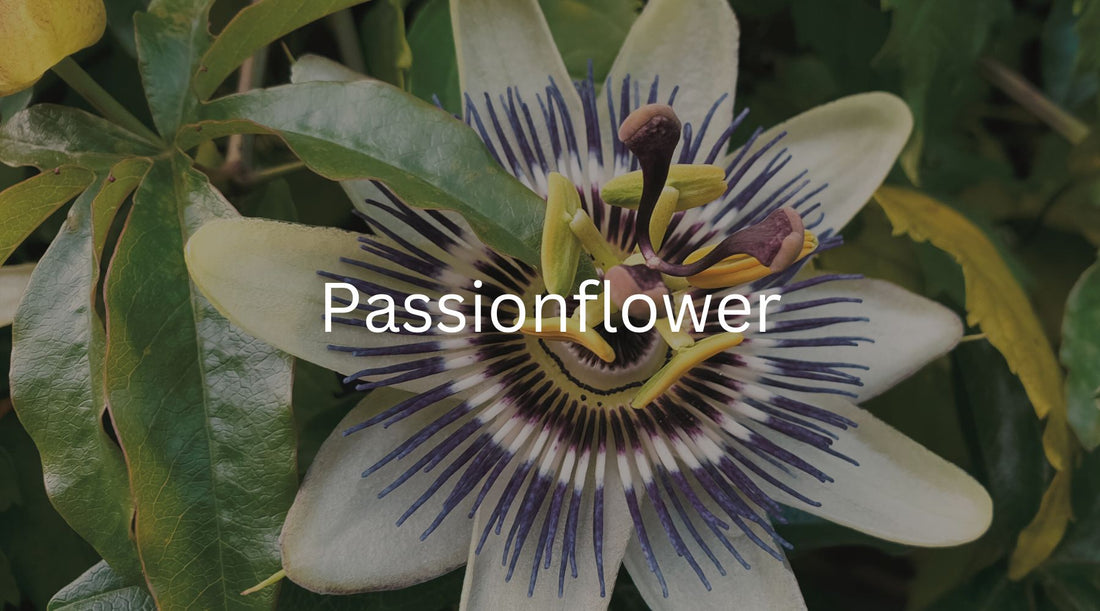If you're feeling anxious, stressed, or overwhelmed by the challenges of everyday life, you might want to try a natural remedy that can help you calm down and relax. Passionflower tea is an organic, herbal tea that has been used for centuries to treat various mental health issues, such as anxiety, insomnia, and nervousness. In this blog post, we'll explore the benefits of passionflower tea, how it works, and how to brew it for optimal results.

A Little History and Culture
Passionflower is a beautiful and fascinating plant that has a long and rich history. It was first discovered by Spanish missionaries in Peru in the 16th century, who named it after the Passion of Christ because they saw symbols of his crucifixion in its parts. For example, the five petals and five sepals represented the ten apostles, the three stigmas represented the nails, and the corona represented the crown of thorns.
Passionflower was brought to Europe and became popular as an ornamental plant and an herbal remedy. Many cultures have used passionflower for its calming and sedative effects, as well as for treating inflammation, insomnia, anxiety, and other conditions. Passionflower tea is still widely consumed today for its relaxing benefits.
Passionflower also produces edible fruits that are sweet and tangy, and are used to make juices, jams, desserts, and cocktails. Some species of passionflower are also important host plants for butterflies, adding to their ecological value. Passionflower is truly a remarkable plant that has captivated people for centuries with its beauty, symbolism, and uses.

What is Passionflower Tea?
Passionflower tea is made from the dried leaves and flowers of the passionflower plant, also known as Passiflora incarnata. This plant is native to North America, Central America, and South America, and has a beautiful purple and white blossom that resembles a star. The name passionflower comes from the Spanish missionaries who saw the flower as a symbol of Christ's passion and crucifixion.
Passionflower tea has a mild, floral flavor that is soothing and refreshing. It can be enjoyed hot or cold, depending on your preference. You can also add honey, lemon, or other ingredients to enhance the taste and benefits of the tea.
What are the Benefits of Passionflower Tea?
Passionflower tea has many benefits for your mental health and well-being.
Reduces Anxiety and Stress
Passionflower tea contains compounds that act on the same receptors in the brain as benzodiazepines, a class of drugs that are used to treat anxiety disorders. These compounds help to lower the levels of cortisol, the stress hormone, and increase the levels of gamma-aminobutyric acid (GABA), a neurotransmitter that inhibits nerve activity and promotes relaxation. Studies have shown that passionflower tea can reduce anxiety symptoms in people with generalized anxiety disorder (GAD), social anxiety disorder (SAD), and preoperative anxiety.
Improves Sleep Quality and Duration
Passionflower tea can also help you fall asleep faster and stay asleep longer. This is because it has sedative effects that can ease muscle tension, calm your mind, and regulate your circadian rhythm. A study found that drinking passionflower tea before bedtime improved sleep quality in people with mild sleep problems.
Boosts Mood and Cognitive Function
Passionflower tea can also improve your mood and mental performance by enhancing your brain's blood flow and oxygen supply. This can help you feel more alert, focused, and creative. Additionally, passionflower tea can reduce depression symptoms by modulating the levels of serotonin and dopamine, two neurotransmitters that are involved in mood regulation.

How to Brew Passionflower Tea
- Place the passionflower leaves and flowers (or teabag) in the teapot or mug.
- Pour the boiling water over them and cover with a lid or a saucer.
- Let it steep for 10 minutes.
- Strain or remove the teabag and enjoy your tea.
You can drink passionflower tea up to three times a day, preferably in the evening or before bedtime. However, you should avoid drinking it if you're pregnant, breastfeeding, or taking medications that interact with passionflower, such as antidepressants, anticoagulants, or sedatives.
Passionflower tea is a natural way to relax and reduce stress. It can help you cope with anxiety, insomnia, depression, and other mental health issues. It can also improve your mood and cognitive function by increasing your brain's blood flow and oxygen supply. If you're looking for an organic, herbal tea that can benefit your mental health, give passionflower tea a try!
Options
Our blend Happy Hibiscus combines the Pacific flowers of passtionflower, noni leaf, and hibiscus to create a refreshing and uplifting tea.
Protect Your Health
When it comes to your health, there is nothing more important. Reach out to your health care provider before taking any herbs. The information provided here is for educational purposes only and is not intended to diagnose, treat, or cure anything. We wish you the best in your journey to health.
Citations
- Link - Anti anxiety property of herbs - Passionflower
- Link - Passionflower: a Reliable Herbal Sedative
- Link - For anxiety disorder
- Link - A double-blind, placebo-controlled investigation of the effects of Passiflora incarnata (passionflower) herbal tea on subjective sleep quality
- Link - an overview of the most tranquilizer herbs.

